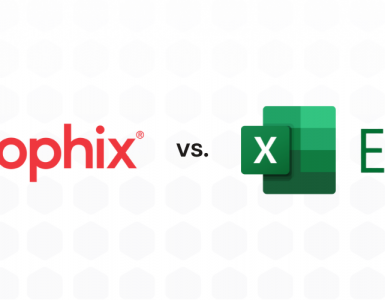It’s easy to think in broad, high-level terms about adding AI to your finance department. You’ll be ‘automating repetitive tasks,’ or ‘consolidating data to drive insights.’ It sounds futuristic, forward-looking with just the right combination of tech and corporate jargon.
But what does AI in finance actually look like in practice? How can your business put AI to work and realize its full potential?
To get the answers, we talked to Jennifer Warawa, Executive Vice President of Partners, Accountants & Alliances at Sage. Jennifer has spent years listening to finance leaders and helping them solve their problems. Her practical take on the topic is invaluable for anyone in a finance role.
Accounting in Finance Q&A with Jennifer Warawa
Prophix: How do you see accountants currently using AI and machine learning? What’s the current level of sophistication?
Jennifer: I would say the sophistication level is probably low. But they also haven’t been totally embracing it, either. The main way that accountants are using AI right now is around automation: Automated bank feeds, automated data entry. Helping save on some of those administrative tasks. And even that, they were a little bit wary of using the automation because, in some cases, that was a large portion of their job. So it’s like, okay, so if I start using this, what is it that I’m going to be doing?
So I think it’s mainly been around that automation/data entry side. But even that, it’s a little bit slower than it probably could be.
Prophix: What advice do you have for businesses who are early in the decision-making process about AI? How can they overcome some of the common hesitation points?
Jennifer: I think one of the things that is interesting is a lot of times businesses only hear the… I don’t want to say “worst case scenario.” But it’s kind of like how people feel about self-driving cars, right? They’ll say, “I heard this self-driving car got in an accident.” Well, when you look at, overall, the ratios of cars to accidents and whatnot, the self-driving cars are actually, safer than regular cars. However, it just takes one person’s accident. Then they’re like, “Oh it doesn’t work. That technology doesn’t work. It’s not ready for me yet.”
So I think the same goes for accounting technology in many ways. You hear about data breaches or security issues. And they say, “Oh, it’s too early. It’s too early for cloud, too early for AI. That didn’t work.” And so I’d just say, first of all, think about it in the context of compared to the rest of the universe and how they are using technology. Even though they might hear about an inaccuracy or data breach or something, it’s usually minor compared to what has happened in the past, even with on-premises solutions.
So that’s the first part: They need to think about the big picture. Because they tend to get scared when they hear one bad story but they just need to put it in context.
The second is this can exponentially free up your time to do more important tasks. So I always encourage businesses to think about, “What can this do for me? How can this actually make my job easier?” And then, “What can I do to add more value to my role?”
Because no matter what way you look at it, if you think about the data entry side, or the bank reconciliations and things like that, that technology is automating… Those aren’t really high-value tasks anyway. So it provides an opportunity. Lots of times people focus on what is it going to take away or what are the risks versus what’s the opportunity.
So I’d say to a business, “This can actually save you a lot of money. What is the ROI? How much can it save you and then what can you do differently?”
I talked to a business the other day and they were talking about how they were leveraging AI and machine learning to automate a lot of tasks in their business, and what they did is they actually moved a number of headcount they had allocated to back-office and finance, and funded more salespeople.
So they said, “Less back office, more front office. Now we’re actually able to increase our sales and still get those back-office functions done.”
Prophix: That’s a great concrete example, thanks. But what are the tasks that finance leaders should be focusing on? What’s the stuff that won’t be automated?
Jennifer: When business leaders are scared of losing their jobs to technology I use the medical profession as an example. You don’t hear doctors saying, “Oh, I don’t get to spend as much time as I used to testing and trying to diagnose what’s wrong with someone. Technology is trying to take my job.”
Doctors say, “Okay, technology allows me to diagnose quicker, so I can actually spend my time helping someone get well versus trying to figure out what the problem is. It has allowed me to spend more time on the valuable activity, which is wellness, not diagnosis.”
It’s the same in the accounting profession. You spend all that time just getting the data entered; that’s not where the value comes in. What you want to do is spend time actually on the wellness side of the business. How do you grow the business? How do you think more strategically? How do you build a business plan and take it to the next level?
And I think when you talk about what aspects of the business should not be automated, when I think about AI, even machine learning, and accountants, I really think it’s a partnership of technology and that human touch. So I think that there’s still a lot of opportunity for the person that knows the business, that understands the business, that can get in and be able to say, “Okay, here’s all the data. And here’s what it’s telling us. But what are we going to do with that? How are we going to action…?”
Here’s a great example. I met with one of our customers last week. And they were talking about when they started as the CEO in the business that they’re in, they said all the data was there. They had all the technology and the AI and, I mean, they had that thing humming along, lots of great information. Everything you ever needed.
But there was no intellectual curiosity to say, “What do we do with this now? So we have all this data and we’ve got all this information, and we have all this. How do we turn that into insights and take action on it?” And he said that’s what was missing. That’s what the human touch needs to do.
That’s when he came in and said, “Now we need to start driving a culture of intellectual curiosity on what do these numbers mean and how are we going to change our business as a result of knowing this information?” And so I think it’s a partnership. Each side makes the other one more effective. That human touch can build on all the data, the intelligence, and the insights, and turn it into something actionable.

Prophix: Where should finance leaders get started with AI? What’s the first step for getting one’s head around it?
Jennifer: The first thing is to spend some time getting really familiar with the facts. I think that a lot of conversations around AI are very, very high level.
There are even companies that say, “Oh, yeah. We use AI,” and they don’t even know what AI is. It’s almost like buzzwords. So finance leaders need to get into the details: “Okay, what are the security things I need to look out for? Which roles in my finance department could be improved or automated or made more efficient through AI and machine learning?” Almost build out a business case for AI.
Get to the point where you really understand it and then build out your own use case for your business.
A lot of reasons that people don’t adopt technology are based on two articles they read and something they saw on the news. They’re just like, “I don’t think that’s for me. It’s not ready yet. It’s too early.” And meanwhile, their competitors are taking it and running with it.
So I’d say, step one, get really familiar with the facts and understand the opportunities. And then, number two, build the case for your business so you can leverage that case for you to be the person that’s bypassing the competition.
Prophix: From what you’ve seen, what do you think the timeline is for AI and automation becoming the standard for finance departments? Are we a decade out? Five years?
Jennifer: Well, you know, I think the opportunity is right now. When does it become standard? I’m in a number of different forums where accounting technology companies get together and talk about what’s happening in the profession and whatnot. I think that, overall, the rate of change and technology adoption in accounting and finance fields is slower than we would have predicted a number of years ago.
So I think that we thought the move to the cloud would be faster, we thought finance professionals would be jumping over it and, “Hey, this is gonna make my job easier and I’m going to be able to hire people to do more meaningful tasks.” That hasn’t been the case. It has been slower than we thought. And, of course, we looked at it through the lens of accountants being sometimes a little bit change averse and risk averse.
I would say we’re behind where we should be right now and people are still trying to weigh the options on what this means for them.
I think that we’re behind where we need to be, but I think that people don’t even understand the full effect of what’s coming. It’s almost like a landslide that’s headed their way and they just are starting to see the effects of that. So I’d say in the next five years, the companies that want to have a competitive advantage will use AI and machine learning.
[bctt tweet=”I would say in the next five years, the companies that want to have a competitive advantage will use AI and machine learning. – @jenniferwarawa ” username=”prophix”]I met with another customer of ours a few months ago in California, and they’re a furniture company. They’re very specialized and everything’s very customized. They’re talking about how their business has grown exponentially over the last number of years.
I said, “So what do you think is your competitive advantage? It seems like you guys are going faster than the competition.” And they said, “Our competitive advantage is our data and the understanding of that data.” They said, “We look every single hour, all the time, we have our pulse on what’s going on in our business. And that’s our competitive advantage.”
So I tell people the rate of adoption, you can adopt AI in ten years, five years, or today. But know that your ability to have a competitive advantage will be dependent on when you adopt technology. So if you’re not prepared to adopt it for ten years, be prepared for the competition to run you over on the way.
Jennifer Warawa is the Executive Vice President of Partners, Accountants, and Alliances at Sage. Follow her on LinkedIn and Twitter. For more expert advice, check out our interactive guide to AI in Finance.
link to interactive asset once live.
Link to interactive asset once live






